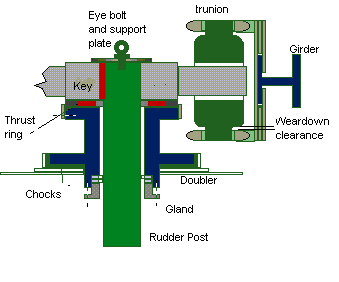
- Back to Home »
- RUDDER WEAR DOWN
Posted by : Unknown
Sunday, August 30, 2015
This refers to the measurements taken generally during a docking period to indicate excessive wear in the steering gear system particularly the rudder carrier. The significance of this is that for ram systems excessive wear can lead to bending moments on the rams. For rotary vane systems it can lead to vane edge loading.The readings taken are offered for recording by the classification society.
Trammel
This takes the form of an 'L' shape bar of suitable construction. When the vessel is built a distinct centrepunch mark is placed onto the ruder stock and onto a suitable location on the vessels structure, here given as a girder which is typical. The trammel is manufactured to suit these marks As the carrier wears the upper pointer will fall below the centrepunch mark by an amount equal to the wear down.
Rudder Clearance
Pads are welded to the hull and rudder. A clearance is given ( sometimes referred to as the jumping clearance). As the carrier wears this clearance will increase.
Steering gear Clearance
Direct measurement can be taken from the steering gear assembly. Shown below is one example, here the clearance will be seen to reduce as the carrier wears and impact his has on the system can be directly judged
Rudder wear down measurement:(Ram type Steering Gear )
At sea:
1)Jumping clearance or bouncing clearance,measured between swivel block and upper ram fork end. (lmit is 19mm)
2)Wear down clearance,measured between swil block and bottom ram fork end. (limit is 12-19mm)
At docking:
1)Bouncing clearance: measured betwen top ofrudde and jmpng bar.
2)Wear down clearance: beween the bottom of rudder and reference mark.
1)Jumping clearance or bouncing clearance,measured between swivel block and upper ram fork end. (lmit is 19mm)
2)Wear down clearance,measured between swil block and bottom ram fork end. (limit is 12-19mm)
At docking:
1)Bouncing clearance: measured betwen top ofrudde and jmpng bar.
2)Wear down clearance: beween the bottom of rudder and reference mark.










